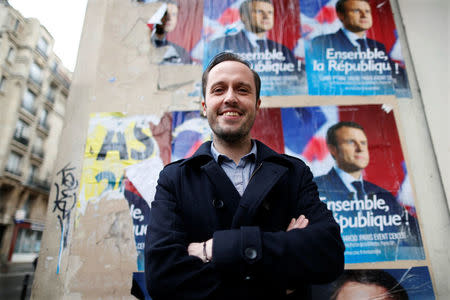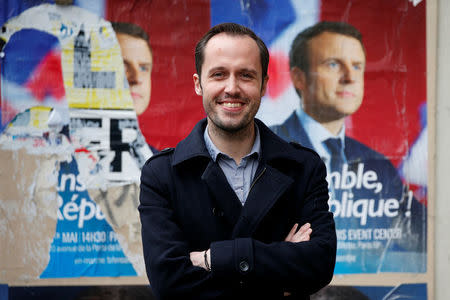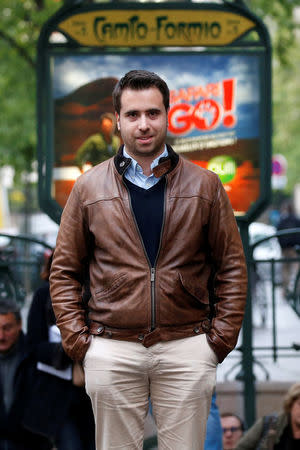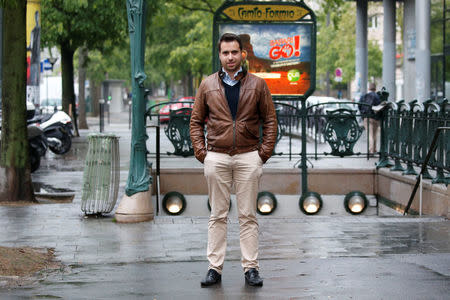Even in the classroom, fraught election exposes France's divisions
By Sarah White PARIS (Reuters) - Between long hours planning lessons or struggling to win the attention of teenage students, teachers Aymeric Durox and Christophe Brunelle are political activists. Both are disenchanted with traditional parties and hope the vote for a new president on May 7 will shake up France. But, echoing broader French society, the two teachers in separate pockets of the Paris suburbs are deeply opposed on who can best deliver the upheaval they think the country desperately needs. History teacher Durox, 31, hankers after a France free of European Union constraints and is campaigning for Marine Le Pen, the underdog in the second-round run-off ballot for the presidency. "I want the French people to have control of their own destiny," he said while refuelling on instant coffee in his home near leafy Fontainebleau, a town on the outskirts of Paris. His living room was scattered with school notes and flyers for "Marine". A poster of General Charles de Gaulle's famous call to French resistance fighters to hold out during World War Two was tacked to one wall. Brunelle, 38, teaches English and is a recent convert to the En Marche! (Onwards!) party launched by former economy minister Emmanuel Macron. Though the centrist movement was created barely a year ago, Brunelle likes its promise of measured but decisive reforms and its vocal pro-EU stance. "He's young. It's what France needs," Brunelle, a former centre-right activist, said of Macron, who is just one year his senior. For him, Britain's decision to leave the European Union in 2016 reinforced the allure of Macron's platform. It has also seduced many teachers with a pitch to give their sector more autonomy. "Macron is willing to look at what works and what doesn't, he has a modern vision," Brunelle said. Polls put Macron well ahead, with backing from 60 percent of likely voters and the vocal support of several of the traditional parties defeated in the first round. But no matter who wins, a deep shift is under way. This election has already broken with decades of centre-right and centre-left rule, and crystallised a conflict over France's identity and place in the world which will help determine the future of the EU. Voters as similar as Durox and Brunelle – who both teach at "lycees" and earn roughly the same 2,000 to 2,200 euros a month – have been moving towards radically divergent alternatives. "People desperately wanted something new," said Philippe Marliere, professor of French politics at UCL university in London. "There was a feeling of 'we don't want those guys (former leaders) any more, their policies and the way they have run the country have failed'." NO LONGER TABOO Durox was incensed in 2008 when his then-champion Nicolas Sarkozy, former conservative president, pushed through parliament an EU treaty handing Brussels more powers, just three years after France had rejected an EU constitution in a referendum. The teacher decided to vote FN in the 2009 European elections. "It was more of a protest vote at the time, and like most first-time FN voters, I had a strange feeling when casting my ballot that this was something serious," Durox said, adding he had grown accustomed to charges that the FN was "pure evil". "In the end, it went alright - no one was waiting for me outside," he joked. Durox is now so sold on the FN, praising Le Pen's efforts to rid the party of its racist image and sharpen its act, he will stand as a candidate in legislative elections in June. "When I signed up to the party, I told myself, 'See if you can do better. Stop being a spectator'," he said. His stance has come at a cost in the school staffroom, he says. Political discussions fall quiet when he walks in and he is regarded as an oddity. Historically, teachers in France have tended to vote for the left. In the first round of the last presidential poll in 2012 just over 40 percent backed Socialist Francois Hollande, who went on to become president. But like others in France, many teachers have been disappointed by Hollande's administration, which brought in disputed changes to school hours and the curriculum. Some 30 percent of teachers leaned towards Macron before the first round of the election on April 23, polling by Cevipof shows, while 25 percent backed hard-left candidate Jean-Luc Melenchon. Yet Le Pen's support edged up from 5 percent in 2012 to around 6.5 percent, and she could garner 17 percent of teachers' votes in the run-off, according to Luc Rouban, a senior researcher with Cevipof. "There's a clear breakthrough and interest in Le Pen among teachers - it's less of a taboo than it used to be," Rouban said. Durox said one reason was worry about immigration, which he argues can hamper efforts to pass on French culture and values. "In some areas, in a class of 30 there are 30 children of foreign origins and the only white person is the teacher," he said, while making clear this was not the case in his school. "If there are too many migrants or they are concentrated in the same areas, they turn back in on their communities, they cut themselves off from everyone else." REVOLUTION Brunelle, originally from southerly Avignon, now teaches on the western outskirts of the French capital. A previous posting was to a school in the gritty Paris suburb of Saint-Denis, home to a large migrant population. "It opened my eyes to a world I'd never known," Brunelle said during a pitstop at a Paris cafe near Macron's headquarters, where he helps out in his spare time. "Some people didn't have the means to buy notebooks. There was also violence, you'd sometimes get students fighting in class." He is enthused by Macron's plans to shrink the size of primary school classes in poor areas with social problems, and to reward teachers there with 3,000 euro-a-year bonuses. He is also enthralled by the man himself, deciding to join his camp after reading Macron's book and mission statement, Revolution. "You can tell that education and culture are close to his heart," said Brunelle. Macron has often mentioned his teacher grandmother as a major personal influence, and is married to his former high school teacher, Brigitte. Brunelle sets store by Macron's ability to bridge a traditional gulf between left and right and forge wide backing for the liberal-minded reforms he wants to introduce to boost a lacklustre economy. He is confident the centrist can win big in legislative elections in June if he clinches the presidency. But he points out that Macron is also willing to pass measures by decree, bypassing parliamentary votes. "Macron has understood we have to rethink politics, that we have to overcome the old divides," Brunelle said. (Editing by Andrew Roche)

 Yahoo News
Yahoo News 





